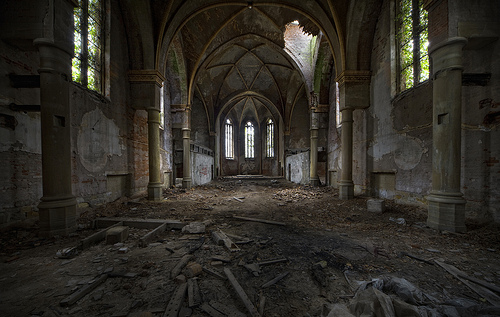We run our website the way we wished the whole internet worked: we provide high quality original content with no ads. We are funded solely by your direct support. Please consider supporting this project.

How To Fix The Church: The Kingdom of God (Part 4)
God has leveraged everything on the Church loving like Jesus loved, as outlined in our previous posts in this series. “By this the world will know you are my disciples,” Jesus said, “by your love” (Jn 13:35). By God’s own design, Christ-like love is supposed to be the proof that Jesus is real. In John 17 Jesus prayed that the community of his disciples would embody the perfect love of the Trinity so that the world would know he’d been sent by the Father (Jn 17:23). Think of the implications of this phrase, “so that.” Above all, we are to be known for the way we manifest the perfect love of the Trinity. We are to be known for our scandalous willingness to love the unlovable, even our enemies—even Islamic terrorists. Our lives are to be so unique that they raise the question in the minds of unbelievers that only accepting the reality of Jesus Christ can answer: namely, why do you love me and sacrifice for me the way you do?
But let us be completely honest. Is the Church consistently putting on display this Jesus-looking, Calvary-quality love? Which is to ask: Is the Church advancing the Kingdom of God? Ask yourself: Are many non-believers walking around wondering why we Christians sacrifice so much in service to them?
Consider that Jesus’ love attracted the vilest of sinners—the tax collectors and prostitutes—just as they were. Are the tax collectors and prostitutes of our day beating down our doors to hang out with us? Do they find that they experience a kind of love and non-judgmental acceptance when they hang out with us that they can’t experience anywhere else?
We don’t have anything close to the reputation Jesus had. If anything, we have the opposite reputation. Ask any random sampling of non-Christians what first comes to mind when you mention “evangelical “ or “born again” Christians. Does anyone for a moment think their first response would be “scandalous, sacrificial love”?
The one thing that matters, the deal breaker, the all-or-nothing of Kingdom life, the thing that God has leveraged everything on, is desperately missing in the Church. No heresy could possibly be worse! (Yet, oddly, never have the heresy hunters in the past or present gone after this heresy!)
What can we do about this catastrophic heresy? How can we infuse Calvary-like love into the Church? How can we transform the Church from a meaningless religious institution into the Kingdom of God?
I’ve come to believe that this is actually the wrong question to ask. The right question—and really the only question any of us need to answer—is this one: Am I myself willing to live in love as Christ loved me and gave his life for me?
This question is much more difficult than the question about how to fix the Church. I’d much rather worry about why the Church at large isn’t more loving. I’d much rather immerse myself in complex theological issues about the Kingdom. I’d much rather talk about the Kingdom than be confronted with the personal task of actually doing it.
The only question I need to answer, and the only question you need to answer, is not one you or I can settle in our heads. It can only be answered with our hearts on a moment-by-moment basis. It is this: Are we willing to love as Christ loved, right here and right now? Are we willing to die to ourselves and bleed for this person, and now for that person? We answer the question of whether we are Kingdom participants not once and for all, but with how we treat each and every person we meet, with every choice we make, with every breath, heartbeat and brain wave that is our life. The Kingdom question is always concrete and existential, never abstract or theoretical.
I’ve discovered that living in this commitment has freed me from my life-long proclivity to be cynical about the Church. As I remain fully devoted to the single task of receiving and replicating Christ’s love in the present moment—toward this person, and now toward that person—I simply don’t have mental or emotional space to worry about or even notice who else isn’t replicating Christ’s love. Fixing them, or fixing the Church, or fixing the world, is not my job.
Image by [AndreasS] via Flickr
Category: General
Tags: Church, Jesus, Kingdom, Kingdom Living
Topics: Following Jesus
Related Reading

Coming Home
The only way we can experience the life God has for us is to give up trying to acquire it on our own. We must surrender ourselves completely to God. This is not merely a matter of believing that our attempts to acquire worth and significance (some of the ways that we do this were…

The Only Starting Point
Sree V. Remella via Compfight Our friend Roger Olson wrote a great article on placing Jesus first when constructing a statement of faith. It might seem like a small thing, but it deeply matters what we place as primary in matters of faith. Let’s always begin with Jesus. From Roger’s blog post: What are we…

Jesus and those “Other People”
Adele Booysen via Compfight Nicky Marshall is the husband of one wife (Raquel), father or two boys (Nathan and Elijah) and serves as assistant pastor at The Living Room Church in Barbados. Nicky is also an Artist and Surfer. He blogs here. “This is Ferozah”. I instinctively stuck my hand out to greet a smiling Muslim…

Why Believe the Virgin Birth Accounts?
Some skeptics claim that the story of the virgin birth of Jesus is derived from similar stories from pagan literature. While I won’t address here the details of the various parallels that some use to argue this point—as it has been demonstrated by many scholars that they simply don’t hold up to scrutiny—I will offer…

Sermon Clip: Brain Reign
In this short clip, Greg Boyd discusses the 3 parts to who we are to help understand the brains role. What does role does the mind, body, and spirit play in who we are? In the full sermon we look at the New Testament teaching on reigning over the relational brain. Understanding how God wired…

True Life Now
Whether we want to admit it or not, experience teaches us that life is a perpetual, relentless process of decay, one that we know inevitably leads toward death. And this fills many of us with a certain amount of angst. Some try to relieve their dread by immersing themselves in mind-numbing entertainment or chemical substances.…
